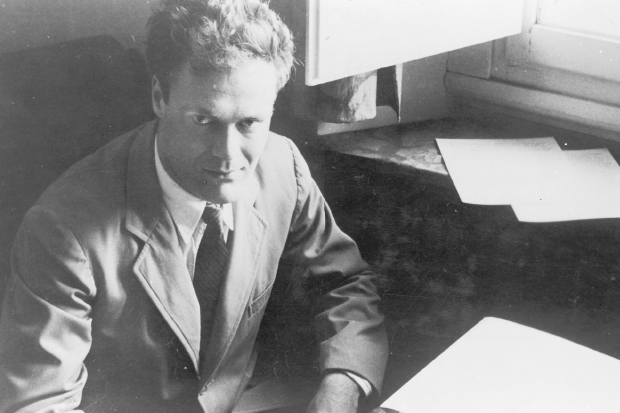The conceit of this book — the author’s third on Robert Lowell — is strong, although its execution is less successful. Lowell made his love life central to his aesthetic project, especially in For Lizzie and Harriet and The Dolphin, and so it makes sense to read his work through his major emotional attachments. Not all of these are romantic: as well as chapters on Lowell’s three wives, Jean Stafford, Elizabeth Hardwick and Caroline Blackwood, and a harrowing section on nine affairs, usually conducted at the start of a manic episode, Meyers devotes attention to Lowell’s mother, Charlotte, the Southern writers who mentored him, such as Allen Tate and John Crowe Ransom, and his female poetic colleagues and students, notably Elizabeth Bishop, Adrienne Rich, Anne Sexton and Sylvia Plath.
Meyers has done sterling work in tracking down Lowell’s mistresses and combing the creative output of his wives for variously refracted images of ‘Cal’; as such the book serves as an important supplement to the biographies by Ian Hamilton and Paul Mariani. It is, however, a book which tends more to anecdotage than analysis.
There is something a little psychologically pat in the idea of the unloved child desperately seeking affirmation and affection in a string of sexual conquests. The chapter on Charlotte Lowell sketches the Freudian dynamic, and refers to poems like ‘Unwanted’, ‘Sailing Home from Rapallo’ and ‘Commander Lowell’ as well as the prose works ‘91 Revere Street’ and ‘Near the Unbalanced Aquarium’, which clearly deal with Lowell’s relationship to his mother. (In an aside on ‘Sailing Home from Rapallo’, Meyers notes that the line ‘The corpse /was wrapped like panetone in Italian tinfoil’ should properly be panforte.) But curiously he does not discuss ‘Clytemnestra’,with its rebuking ending: ‘A genius temperament should be handled with care.’
Time and again, as Meyers sketches out Lowell’s various relationships, it seemed as if lines from the poetry that might illuminate the situation were missing. What do we make of Lowell’s reliance on the journalist and political activist Blair Clark in the context of a man who could write ‘How we wish we were friends with half our friends!’ The same man who could be praised for his seminars would write of ‘the pure witchery-bitchery of kindergarten writers’, tellingly feminising the clique. Meyers notes the frequency of ursine comparisons to Lowell, but does not press on to say how it might influence the lines in the stunning ‘Reading Myself’: ‘the corpse of the insect lives embalmed in honey, /prays that its perishable work live long /enough for the sweet-tooth bear to desecrate — /this open book… my open coffin.’
That the book foregoes depth of close reading might not be problematic except for a continual and rather irksome flaunting of other literary references, a kind of Rolodex tic. For example, we have:
In ‘Easter 1916’ W. B. Yeats wrote ‘Too long a sacrifice /Can make a stone of the heart’, but Hardwick’s heart continued to beat in sympathetic rhythm with Lowell’s.
Or:
Caroline Blackwood had bountiful gifts and a tragic family life. Like the mother in D.H. Lawrence’s ‘The Rocking-Horse Winner’…
Or:
Her father’s great wealth gave the spoiled darling — like Maggie Verver in Henry James’s The Golden Bowl — the best of everything.
(One also notes in passing that the flyleaf boast that the author has been published on six continents seems rather gauche, given how underdeveloped Antarctic publishing currently is.)
Such infelicities aside, Lowell’s story is nevertheless unspeakably harrowing, both in terms of what he endured and what he inflicted. Being the object of his ardour meant being a muse, a nurse and a punch-bag. The riven complexities — compare a poem as shudderingly horrible as ‘To Speak of the Woe That is in Marriage’ with the sublime tenderness of ‘On the End of the Phone’ — are what make Lowell such an intriguing love poet. His madness is not as interesting as what he brought back from madness. His depression was, in an amatory roller-coaster of a life, the constant. As he wrote in ‘Sick’: ‘None of us can or wants to tell the truth /pay fees for the over-limit we caught, while floating /the lonely river to senility /to the open ending. Sometimes in sickness /we are weak enough to enter heaven.






Comments